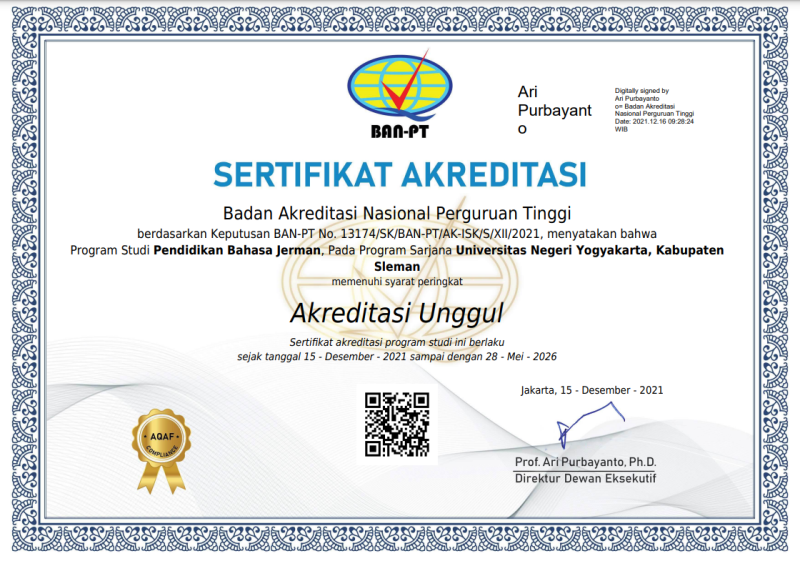Telp : (0274) 550843 Ext 512
You are here
History
Primary tabs
The Department of German Language Education is one of the departments at the Faculty of Languages and Arts, Yogyakarta State University. This department was founded in 1976 as the Department of Foreign Language Education. Along the time, the Yogyakarta Institute of Teacher Education and Educational Sciences was transformed into Yogyakarta State University, and the Department of Foreign Language Education also grew and divided into two departments: French Language Education Department and German Language Department in August 23, 2005.
In 2016, The German Language Education Department is accredited “A” by Badan Akreditasi Nasional Perguruan Tinggi (National Accreditation Agency for Higher Education). The department keep working on the quality and improving every aspect that support the learning process. As the result, German Language Department is succeeded as the first German Language Department in Indonesia that accredited as “Unggul”, the highest mark of accreditation from BAN-PT.

The enhancement of educational quality within the program is not only pursued through national audits but also through the engagement of international audit. This aligns with the faculty's vision as articulated in the Strategic Plan for 2019-2025, which aims for excellence in the Southeast Asian region by the year 2025. In 2018, the Faculty of Language and Arts Education facilitated the program in undertaking external benchmarking in the form of an international quality audit with the Accreditation Service for International Schools, Colleges & Universities (ASIC). Based on this external benchmarking exercise, the quality assurance of the German Language Education program at the Faculty of Language and Arts Education, Universitas Negeri Yogyakarta (FBS UNY), was deemed satisfactory. This ASIC accreditation is valid from July 2019 to July 2023.Nowadays, German Language Education Department is still working hard on keeping the quality and on the process to internationalize the program. Academic cooperation with institutions, both locally and internationally, has been extended. Apart from the university’s attempts to establish a reputation for academic excellence, during the current era of the department’s development, one of the main purposes is also to train all its graduates so that they evolve into knowledgeable individuals with a strong sense of moral values. The main outcome of these development efforts is producing graduates with the requisite knowledge and moral values in the present and in the years ahead.
Kontak Kami
Telp : (0274) 550843 Ext 512
Copyright © 2026,
